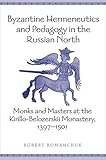Byzantine hermeneutics and pedagogy in the Russian north : monks and masters at the Kirillo-Belozerskii Monastery, 1397-1501 / Robert Romanchuk.
Material type: TextPublication details: Toronto ; Buffalo : University of Toronto Press, 2007.Description: 1 online resource (xv, 452 pages)Content type:
TextPublication details: Toronto ; Buffalo : University of Toronto Press, 2007.Description: 1 online resource (xv, 452 pages)Content type: - 9781442684102
- 1442684100
- Orthodox Eastern Church -- Education -- Russia (Federation) -- Kirillov -- History -- 15th century
- Kirillo-Belozerskiĭ monastyrʹ -- History -- 15th century
- Kirillo-Belozerskiĭ monastyrʹ
- Orthodox Eastern Church
- Kirillo-Beloserski-Kloster
- Hermeneutics -- Religious aspects -- Orthodox Eastern Church -- History -- 15th century
- Orthodox Eastern monasteries -- Russia (Federation) -- Kirillov -- History -- 15th century
- Herméneutique -- Aspect religieux -- Église orthodoxe -- Histoire -- 15e siècle
- Église orthodoxe -- Russie -- Kirillov -- Éducation -- Histoire
- Kirillo-Belozerskiĭ monastyrʹ -- Histoire -- 15e siècle
- Monastères orthodoxes -- Russie -- Kirillov -- Histoire -- 15e siècle
- HISTORY -- Medieval
- PHILOSOPHY -- Epistemology
- Hermeneutics -- Religious aspects -- Orthodox Eastern Church
- Education
- Orthodox Eastern monasteries
- Russia (Federation) -- Kirillov
- Hermeneutik
- Pädagogik
- Buch
- Geistesgeschichte
- 1400-1499
- Geschichte 1400-1500
- 121/.6809471 22
- BD241 .R59 2007
- online - EBSCO
- BO 5080
- digitized 2010 HathiTrust Digital Library committed to preserve
| Item type | Current library | Call number | URL | Status | Notes | Barcode | |
|---|---|---|---|---|---|---|---|
 eBook
eBook
|
Biblioteca "Angelicum" Pont. Univ. S.Tommaso d'Aquino Nuvola online | online - EBSCO (Browse shelf(Opens below)) | Online access | Not for loan (Accesso limitato) | Accesso per gli utenti autorizzati / Access for authorized users | (ebsco)682478 |
Browsing Biblioteca "Angelicum" Pont. Univ. S.Tommaso d'Aquino shelves, Shelving location: Nuvola online Close shelf browser (Hides shelf browser)
Includes bibliographical references (pages 371-405) and indexes.
'Where is the Russian Peter Abelard?': Silence and intellectual awakening at the north Russian monastery -- The 'artless word' and the artisan: approaching monastic hermeneutics in eastern Europe -- 'Strangers to the world, fixing our minds in heaven': St. Kirill's Laura as a textual community (1397-1435) -- 'The lover of this book': 'philosophy' under Hegumen Trifon (1435-1448) -- Intermedium: the schooling and professionalization of scribes, 1448-1470 -- 'The best thing of all is one's own will': the community of scholars at Kirillov (1470-1501) -- Epilogue: Some possibilities and limits of 'Byzantine humanism'.
Use copy Restrictions unspecified star MiAaHDL
Electronic reproduction. [Place of publication not identified] : HathiTrust Digital Library, 2010. MiAaHDL
Master and use copy. Digital master created according to Benchmark for Faithful Digital Reproductions of Monographs and Serials, Version 1. Digital Library Federation, December 2002. MiAaHDL
http://purl.oclc.org/DLF/benchrepro0212
digitized 2010 HathiTrust Digital Library committed to preserve pda MiAaHDL
Print version record.
The Kirillov Monastery at White Lake in the far north of the Muscovite state was home to the greatest library, and perhaps the only secondary school, in all of medieval Russia. This volume reconstructs the educational activities of the spiritual fathers and heretofore unknown teachers of that monastery. Drawing on extensive archival research, published records, and scholarship from a range of fields, Robert Romanchuk demonstrates how different habits of reading and interpretation at the monastery answered to different social priorities. He argues that 'spiritual' and 'worldly' studies were bound to the monastery's two main forms of social organization, semi-hermitic and communal. Further, Romanchuk contextualizes such innovative phenomena as the editing work of the monk Efrosin and the monastery's strikingly sophisticated library catalogue against the development of learning at Kirillov itself in the fifteenth century, moving the discussion of medieval Russian book culture in a new direction. The first micro-historical 'ethnology of reading' in the Early Slavic field, Byzantine Hermeneutics and Pedagogy in the Russian North will prove fascinating to western medievalists, Byzantinists, Slavists, and book historians.









